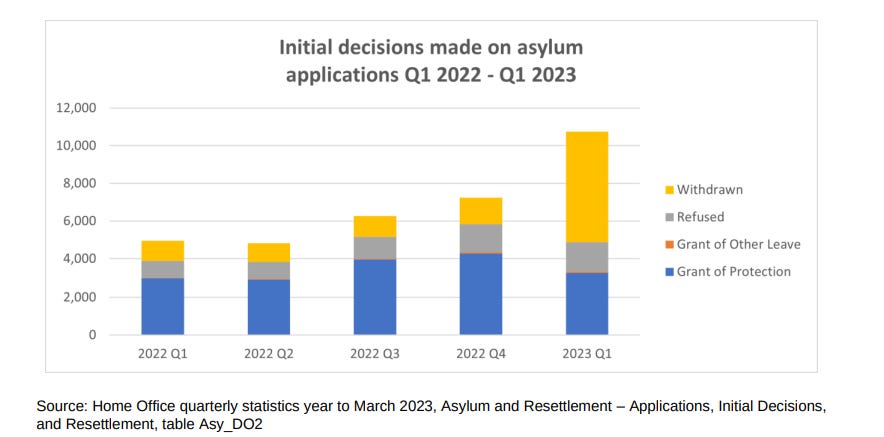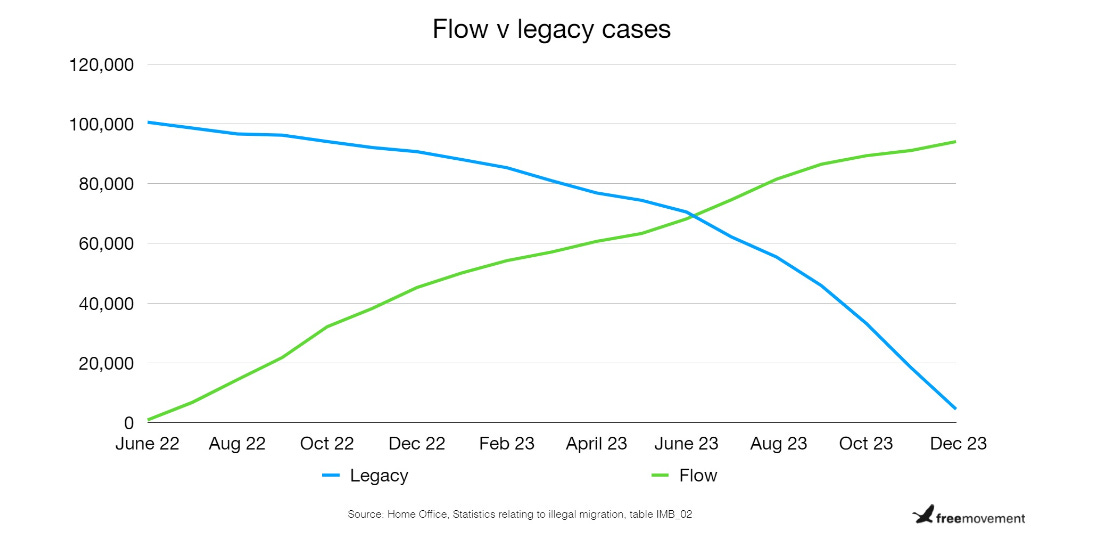Stripping out the bullshit from the asylum debate
Rwanda is a fairy tale. Here's the truth about what's going on in the system.

Next week, the Rwanda bill will be back in the Commons. You'll hear a lot of chatter about the various Tory factions, and their various half-witted ideas, and the various people who are opposed to them. But what you will not see is any coverage whatsoever about what’s actually going on in the asylum system. It'll all take place in a fairy world version of reality, based on impracticable plans and impossible dreams.
That's what this piece is about. It's about what is really going on. It's long and it's ugly and at various points you'll want to kill me, but by the end of it you will understand what is actually happening.
Cast your mind back and you might remember three key events in the government's attempt to stop the boats. The first was the Nationalities and Borders Act 2022. The second was the Illegal Migration Act 2023. And the third was the Rwanda plan. Not one of them worked. As we'll see, each one of them was proposed, then criticised, and then introduced, at which point it failed. Fell right on its arse. All any of them have achieved, on a practical level, is to increase the size of the asylum backlog - the number of people waiting for their claim to be processed. And that right there is the real story of the British asylum system.
The small boats problem is real. In the year ending March 2023, the Home Office received 75,000 claims - double that of March 2020 and the highest number since 2003. Around 44% of them arrived by small boat.
But the core factor in asylum is not the level of claims. It is the speed of processing them. And here, we have seen a complete collapse in administrative competence. In 2021, the Independent Chief Inspector of Borders and Immigration found it took an average of nearly 15 months to come to an initial decision on the asylum claim. In France, it was eight months. In Germany, it was seven. Both receive higher volumes of claims than we do.
The home affairs select committee has concluded that flaws in processing are a more significant cause of waiting times than the increase in applications. In 2017, 43% of asylum seekers waited more than six months for their decision. In 2020, 61% of them did. By March 2023, the number stood at 75%.
The asylum seekers trapped in this process are basically having the life sucked out of them. It's as if the government extracts everything that makes it worth living - creativity, productivity, consumption, basic human relationships - until they're left a hollowed out shell. They are paid £1.25 a day to live on. They are banned from working. They don't have the funds to visit friends. So they simply shrivel away into nothing, trapped in a bureaucratic process which has ceased to function.
This kind of cruelty costs a lot of money. The Home Office spent approximately £3.6 billion on asylum support costs in 2022-23, nearly double the amount in the previous year. Most of this goes on hotels, where asylum seekers are placed while they wait for the decision. This accounted for £2.28 billion. It would not be remotely necessary if the claims were processed quickly.
Nearly half of the asylum seekers in hotels are from Afghanistan, Eritrea, Iran, Sudan and Syria. These are countries with exceptionally high pass rates, as this graph from the Refugee Council makes clear.
The reason they have very high pass rates is because those countries are torn apart by war and oppression, so the claim is almost certainly going to be valid. Given that asylum seekers from these countries are overwhelmingly likely to be granted asylum, the most obvious thing to do is to speed up the system, grant it to them, turn them into working tax-paying residents and save the money we otherwise spend on hotels.
To his credit, this is what Rishi Sunak once intended to do. In December 2022, he made a promise which would define everything that came next. He pledged that the Home Office would "abolish the backlog of initial asylum decisions" by the end of 2023. And then, last week, he tried to start the year with some good news by claiming that he'd accomplished it. He hasn't, of course. It’s bullshit. But we'll get to that in a moment.
When he made the promise, Sunak was at the early point in his administration. He was still - you might remember this period, 481 resets ago - the master technocrat intent on getting things done in his tiny expensive trousers. He hadn't yet gone completely mad on the toxic fumes of populism. So he did something very sensible. He massively increased the number of Home Office caseworkers to handle asylum claims, reduced staff turnover, and streamlined the decision-making process for countries which are nearly always rejected, like Albania, and ones which are nearly always accepted, like Afghanistan.
There was a considerable degree of success here. In December 2022, there was the equivalent of 1,237 full time staff on asylum casework. By December 2023, there were 2,405. Just as importantly, the government slowed the rate of staff turnover. In April 2022, the annual turnover rate of caseworkers was an eye-watering 46%, roughly equivalent to a branch of McDonald’s. Staff are now paid £1,500 if they stay a year and £2,500 annually if they stay longer than two. As a result, annual turnover reduced to 25% by April 2023. Still high, but not so extreme.
Streamlining was initiated in February 2023 for applicants from Afghanistan, Eritrea, Libya, Syria, and Yemen. It allowed caseworkers to grant asylum without an interview if an applicant came from a country which was very likely to be accepted. Thousands of questionnaires went out.
It seems to have been powerfully effective. There are two tell-tale numbers. The first is a huge increase in decisions, totalling 112,138. And the second is that there's no corresponding increase in interviews, which total just 54,937. That gives a strong indication that the streamlined process, which can grant asylum without an interview, is working well.
This led to a triumphant Sunak statement at the start of the year. He'd done it. "Legacy backlog cleared as plan to stop the boats delivers," a Home Office press release exclaimed, feverish with excitement. "In one four-week period from November 20th to December 17th 2023, there were 20,481 initial asylum decisions made," it read, "this is more than the number of asylum decisions made in the entirety of 2021."
The media reception was distinctly chilly. It focused on 4,500 complex cases which couldn't be handled quickly and needed more work. But this wasn't where the real story was. The real story is about a process called withdrawal, which allows the Home Office to rig the numbers, and in the arbitrary separation of backlogs.

There are basically three possible results in an asylum claim: Accepting it, rejecting it, or withdrawing it. A tiny minority of withdrawals happen because the asylum seeker removed their claim or left the country. But in most cases, the claim is withdrawn by the Home Office without the asylum seeker’s consent.
It's in this third category that Sunak has been playing one of his clever little games. On paper, a withdrawal is as good as an acceptance or a refusal. It is a completed asylum case. It clears the backlog. And so they went wild on them.
The rate of withdrawals is usually around 15-20%. It was around that level when Sunak made his December 2020 pledge to clear the backlog. And then look what happens in the graph below, from the Refugee Council. It shoots up. By the mid-point of 2023, withdrawals accounted for 55% of decisions
.
By the end of the year, there'd been 35,000 "non-substantive decisions" as the Home Office calls them, in its deathless prose. The vast majority of these will have been withdrawals. They account for 31% of all decisions during the year.
How had they managed this? By mangling people's lives. Officials talking to the i's Lizzie Dearden said that asylum seekers without an address on file were withdrawn without being contacted, even when the Home Office had their email and telephone number. Where phone calls were made they were in English without an interpreter. The deadline for asylum seekers to respond to letters on interview attendance was cut from ten working days to five.
Put all these factors together and you get the result you want. The Post Office is dysfunctional and experiences delays. Asylum seekers often can't speak English. Some don't have legal representation. Many have been in stasis for years, when suddenly there's communication demanding responses at very short notice, being sent to addresses they may not be staying in. The whole thing seems clearly rigged to secure a withdrawal. And that's what they got.
The second technique Sunak used was the arbitrary separation of backlogs. It's like a street side game in which you have to guess which cup the ball is in. You point at one and - hey presto - it's in another. The same happens with asylum seekers. In the system, out of it, in again and - hey presto - they're in a new backlog. One that doesn't count for Sunak's promise.
There are, in reality, at least three separate backlogs. Any claim made before June 28th 2022 is in the Legacy Backlog. This is the one Sunak promised to clear by the end of last year. Asylum seekers withdrawn from their claim can reapply and start all over again, but if they do, they'll be making a new claim and end up in a new backlog. It will have been a tremendous waste of money, of course, and they'll lose more years in bureaucratic stasis. But it won't affect the legacy numbers, which is all that matters for the prime minister. A little shuffle of the spreadsheets, another ruined life, but the pledge is satisfied nonetheless.
Any claim made after June 28th 2022 is in the so-called Flow Backlog. This is split into various strands. Applications between June 28th 2022 and March 7th 2023 come under the Nationality and Borders Act. Under this Act, the home secretary could declare an asylum claim inadmissible if the person had a connection to a "safe third country", which they would be returned to. At the time it was sold as a fool-proof way to stop the boats. In reality it was an act of fantasy.
People who fell into this category were issued with a "notice of intent" referencing the country they'd be returned to. But in the objective world which actually exists, Britain barely has any return agreements. So in practice these usually just refer to Rwanda. Except we can't send people there either, because it's currently unlawful, and even if we could they don't have the capacity. So what happens? Absolutely nothing. These people just sit there in a political invention, with a letter saying they will be sent to a country which cannot take them.
That situation lasts for a designated period of time - it was once six months, it's now considerably longer. And then they are brought back into the asylum processing system. It is a completely pointless period of state-mandated limbo introduced for no good reason at all, to satisfy legislation which was never going to work, on the basis of a global returns system which does not exist. As of December 28th 2023, the size of this backlog is 38,529.
Applications made after March 7th 2023 are counted as Illegal Migration Act cases. Technically, there are two designations within this cohort, but let's not make this any more complex than it already is. This relates to the next piece of legislation the Home Office introduced to stop the boats, the one which would definitely no-doubt-about-it work this time. It aimed to achieve this by closing down the asylum process altogether and not processing any claims at all. It’s never been fully enacted, but the sum result is an additional backlog that currently stands at 55,533.
The real result of Sunak's claim to eradicate the Legacy Backlog was that the Home Office stopped processing new asylum claims. And as soon as they did that, the Flow Backlog began to massively expand. You can see it pretty fucking vividly from this Free Movement graph.
This is the game that has been played so that Sunak can hit his target. It is defined by its arbitrariness. The one year deadline was arbitrary. The backlog designations were arbitrary. The rules which led to withdrawals were arbitrary. None of it had any sense of practicality. But more importantly, neither did it have any sense of natural justice, or basic fairness, or fundamental morality.
This is what nearly always happens to the lives of those trapped in the dynamics of a political promise: they're shuffled from one data set to another in whatever pattern best serves those in power. If they're lucky, they're in a streamlined asylum process. If they're unlucky, they're sat in Flow Backlog limbo.
Asylum seekers have been turned into a raw human material, to be moulded and battered and sliced up and redesignated as is most convenient at any given time.
Next week, when the Rwanda bill returns to the Commons, we'll talk about them again, but we won't talk to them. They won't sit on the TV news sofas as it's debated. They won't have columns in the newspapers. If they did, if we spent just one solitary minute listening to their experience, we would discover the inadequacy of our asylum system for ourselves, and the inadequacy of our political leaders as well.
Odds and sods
Two people made this piece possible. The first is Sonia Lenegan, who writes for the vital Free Movement blog, and whose links are all over this piece. She combines all the best qualities: fury, forensic research and a sense of humour. They don't normally go together, but somehow she manages it. The second is Lizzie Dearden, home affairs and security journalist, who's been plugging away mercilessly on the withdrawals issue all year. Thank god there are people like them doing it. You can follow Sonia here and Lizzie here.
See you next week.






I wish I could say I am surprised at this but I'm not. As a former civil servant and HR Manager who knew and recruited people who left the Home Office to join our department the backlog limbo is nothing new infact a former HO employee told me it was common place for those processing claims under Theresa May's hostile environment era to withdraw claims without reading them when instructed in order to clear a backlog, it clearly still goes on then. The inhumanity of it all is just sickening but the incompetence is infuriating. Labour claims it will hire a huge amount of caseworkers to clear the backlog I truly hope this is the case, as I often sadly have to remind people of power in my proffesion as a HR Consultant these are peoples lives you are manipulating they are not just numbers on spreadsheets. Thank you to everyone involved in such painstaking and vital research into the truth behind the broken asylum system in this once empathetic country.
In the same period that 75,000 asylum applications were made, long-term non-EU immigration to UK was 988,000, which is 13x as much. What's the govt thinking that waves in thirteen non-EU people who enter through an arrivals gate, but shoves a fourteenth - who makes an asylum claim - into this administrative limbo? What's the plan, and can we see it? [https://www.ons.gov.uk/peoplepopulationandcommunity/populationandmigration/internationalmigration/bulletins/longterminternationalmigrationprovisional/yearendingjune2023]